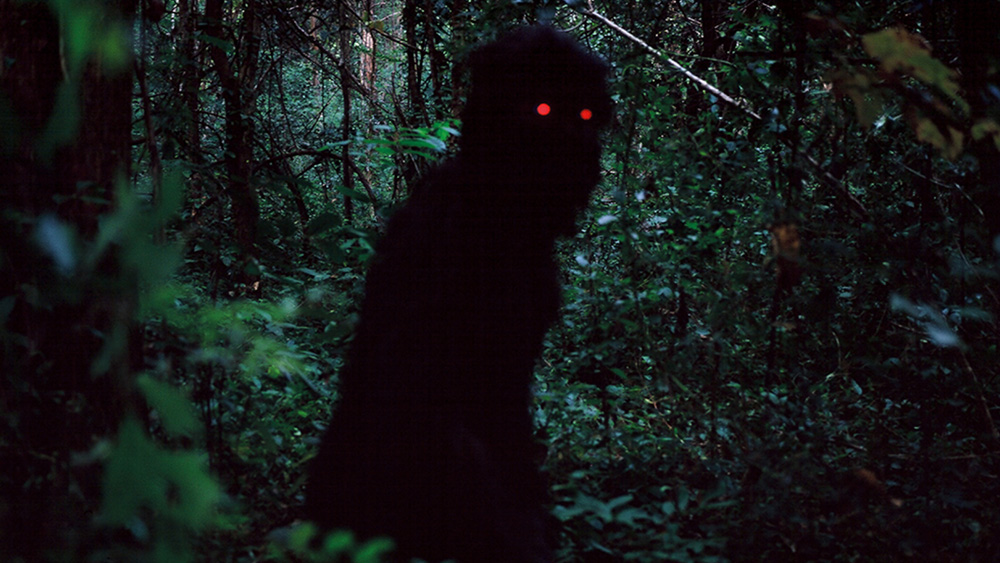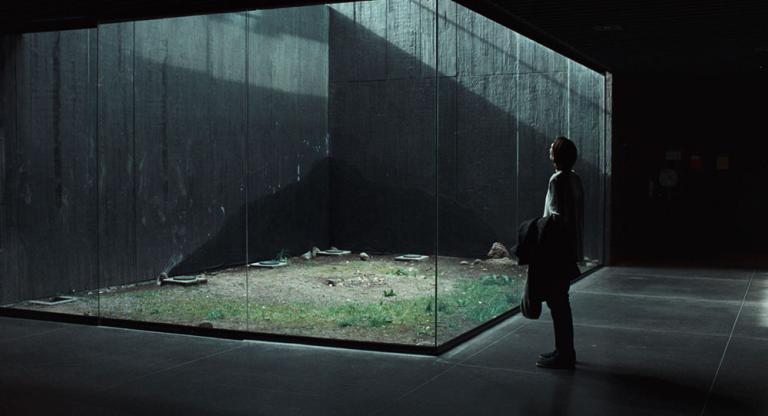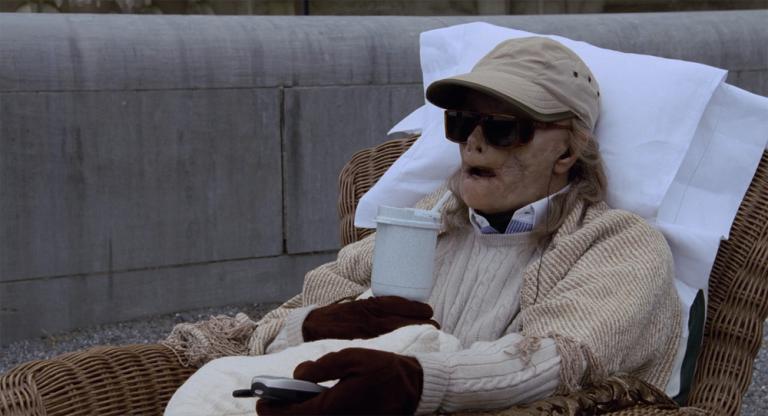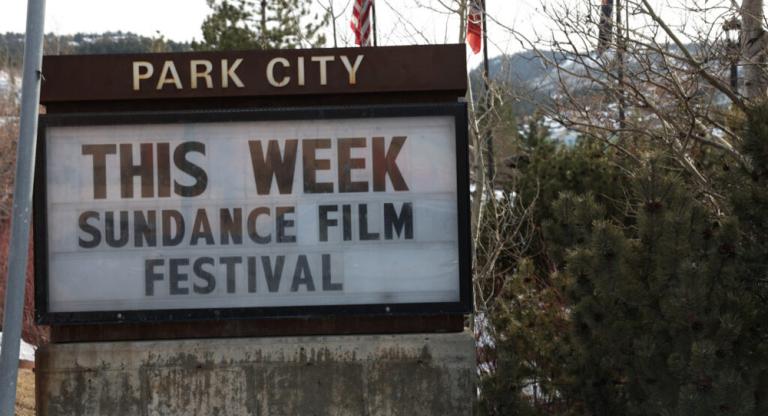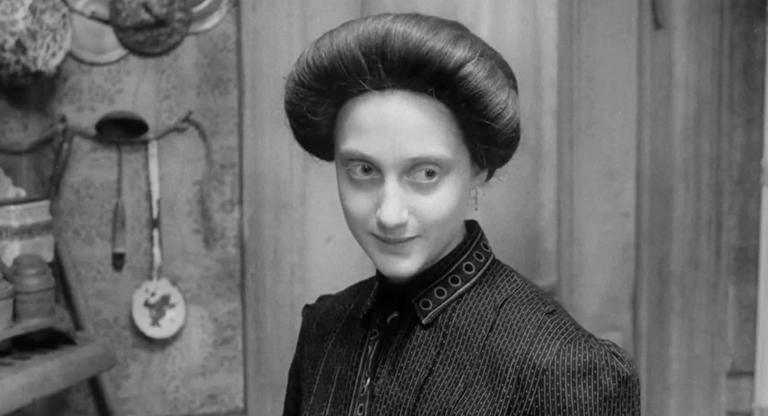Apichatpong Weerasethakul doesn’t watch movies any more; he prefers to listen to the air. The handful of films he’s selected to accompany his own at Film at Lincoln Center reflect the influence of his years attending the School of the Art Institute of Chicago. Since that time, he’s built a body of work that reflects a deeply personal relationship with the world more than with other films, and has even won a Palme d’Or for his trouble. The cult following that seems to have sprung into full force by the time his latest feature film Memoria (2021) was released sits uneasy with the artist. When asked about the influence he exerts on young filmmakers who want to make something “like Apichatpong,” he winces. And yet his influence is undeniable, making this trumpeted retrospective more than overdue.
Inney Prakash: I know it affects your work, so I wanted to ask, how have you been sleeping lately?
Apichatpong Weerasethakul: Oh, it’s pretty OK. Because I am more religious with how I eat [laughs] and how I schedule my time.
IP: Good. And no more exploding head syndrome?
AW: No more. There's some, but not often. An echo, but not much.
IP: I know you've already started to travel around doing retrospectives around the United States. What has that been for you, this extended moment of reflection?
AW: I used to not like doing this, but now I think I kind of enjoy sharing and hearing, and I'm really curious why people come to see my films. So I've been holding off on this U.S. institution travel for a long time, until now because I feel like, "OK, I'm ready." This is quite new to me, too.
IP: Are you really curious about why people come to see your films?
AW: Well, to see films in general, I think, because I myself kind of lose passion to see films or listen to music.
IP: Why is that?
AW: I just feel that I enjoy something real, like the sound of the air or whatever, and just being with my environment.
IP: Do you feel like that has to do with where you are in your life, or where we are in society, or both?
AW: No, I think it's me. It's getting older and appreciating what's around me. But I'm still really happy to make films and to make whatever things, and travel. It's not about losing interest in cinema, but more about watching cinema.
IP: On the note of presence and appreciating what's around you, I’ve heard you talk about how you feel you could have become a monk, and you’ve related cinema to political and spiritual life. Do your spiritual life and your filmmaking life intertwine?
AW: Maybe at one point I wanted to be a monk, but now I think to be a monk is something really the opposite what I want to be. The life of discipline is something that I'm not appreciative of. And I think in cinema when we talk about spiritual, it is so broad, but I think it's about how you position yourself in the world—again, in your environment—and just make everything without having a concrete flow. It's more about flowing and whatever comes. I don't know if that can be called spiritual.
IP: Do you meditate?
AW: I do, yeah.
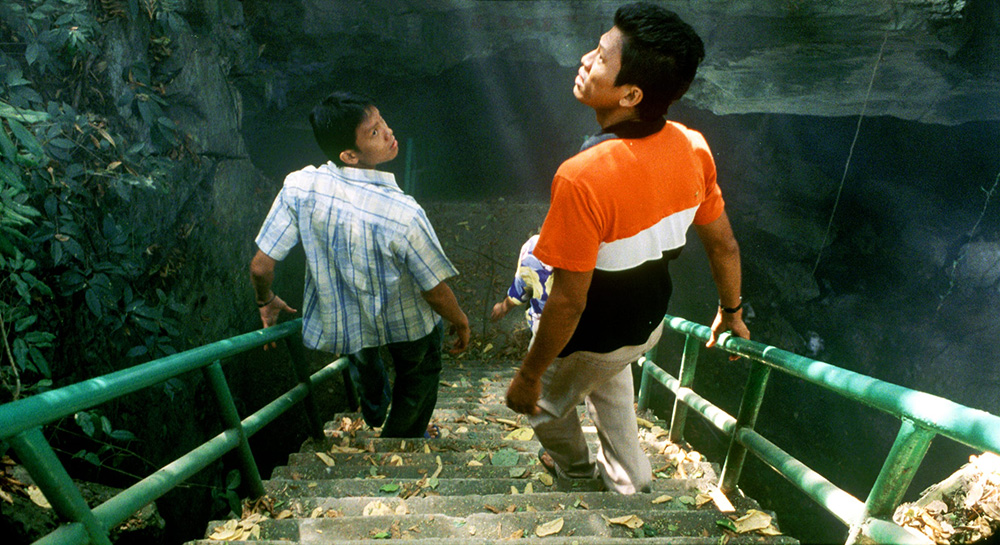
IP: This is a fitting moment for a retrospective, not only because you've made enough films, but because I think your work is more influential than it's ever been. I talk to so many young filmmakers who want to make something like Apichatpong, or make something like Tropical Malady [2004]. I think your work gets referenced so often in terms of young filmmakers' ambitions. How does that feel for you, and what are the conversations that you have with young filmmakers these days?
AW: I'm not sure if it's healthy to make films like someone [else], even though I'm also following Abbas Kiarostami, Tsai Ming-liang, and whatnot. But I think the crucial thing is: Who are you? What is your time? What is your view? All these things that will influence your movies. This trip in the U.S. is also to talk to younger filmmakers.
IP: Do you notice your work being imitated and homaged in newer films, or do you not watch new films so much?
AW: I don't watch that many films nowadays.
IP: What is your relationship with your own past work now? Going back, including the shorts and from Mysterious Object at Noon [2000] onwards, do you still identify with the early films and see them as part of the same project you're doing now? Or do you feel you've entered different phases and that they represent a former version of your creative self?
AW: I don't want to watch my past films, and I feel that when I do I discover it changes, because you realize that you are being yourself in another temperament, another person. But in any case, I more enjoy watching my short films, if I have to watch, but not the features. But now we are doing a restoration, actually, of the past films, the 35mm ones, 2000s period. So now I will confront those.
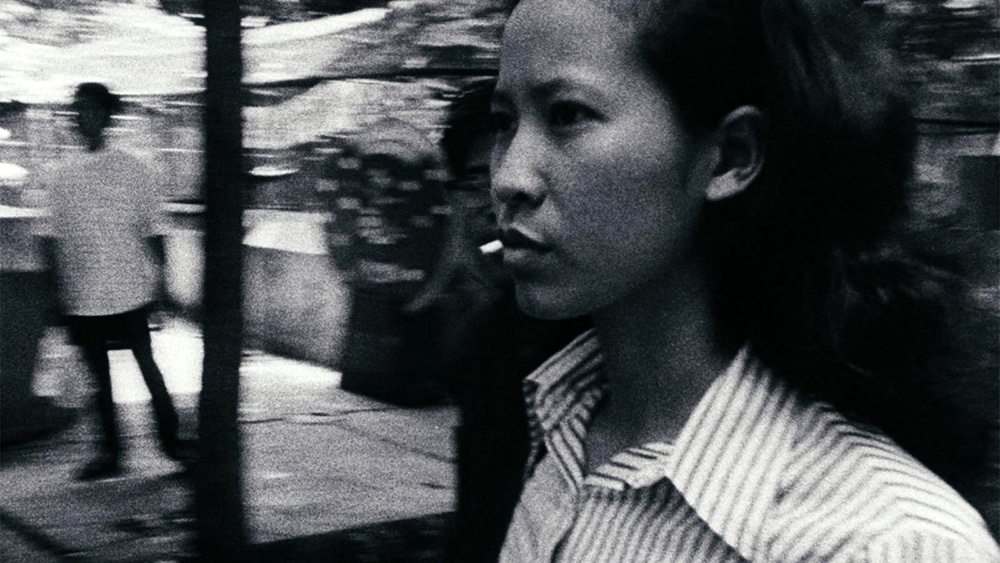
IP: You're incredibly prolific with short films. What function does that serve for you, continuing to do the short work, even as you have a fully bloomed feature career?
AW: Shorts are freedom in a different way. Mostly I shoot the shorts myself, and edit myself. When you shoot things yourself, you become a camera, the way to look. So it's a different process, and I feel that it's part of questioning the way of looking, but sometimes it's also about finding out about what happened in history, in certain areas. There's different purposes.
IP: Can you talk about the way you've organized the shorts? Will they show at Lincoln Center the same way we showed them at Maysles and you've showed them other places, in these programs you've sort of put together yourself?
AW: I'm not sure. Normally, I send a list of short programs. I have a suggested order, which is mixing years and mixing meshes of memory in different formats and different eyes, let's say—different camera technology.
IP: How did you come up with that? Was it an intuitive sense of what goes together, or did you have a specific strategy?
AW: I think they all can go in whatever way—because it's me. I think that's why I'm also interested in installations. Lately, I've started to put some short-form installations together. And when you put it in different orders, the works are different. They create different dialogues. This I found very interesting.
IP: You have a new short film that revisits Blue [2018].
AW: In Blue, Jenjira [Pongpas Widner], my actor, couldn't sleep. She was with this theoretical backdrop, and then she's on fire. But for On Blue [2022], I want to see that she's sleeping and dreaming, and there's an idea of water, and the idea of this theoretical backdrop becomes more active and terrorizes her sleep.
IP: And what about this other project, A Conversation with the Sun?
AW: That's ongoing. I really like looking at the sun and taking a long walk, and that's how the idea came up. So the Conversation with the Sun has many forms. One form is an installation where the wide screen becomes active, and in the space it kind of moves around with the protection of my footage of all these years of accumulating diaries from my small camera. It's really magical, actually, but hard to recreate. It only showed once in the back of the gallery for two months.
And then there's VR. There's another conversation. The VR is playing with this concept of looking, or activities in the evening, progressing to the night and through the dream. where you put on the VR [headset] and then you discover another kind of lights, mimicking the sun. But it puts you back in the original image—in the cave, and the shadows. It's hard to say. There's no story again, but it puts you in the state of just being present.
IP: I feel like that's what I get out of your work, generally. I wonder, have you seen a film called Answering the Sun [2022] by Rainer Kohlberger?
AW: Uh-uh.
IP: It's an hourlong film that's just color and strobe. And the premise is also the filmmaker conversing with the sun. It's a very intense experience, if you get the chance. I wanted to ask though, speaking of other filmmakers, can you talk a little bit about the repertory selections you've made to go alongside your retrospective? I think that you've selected some films by Frederick Wiseman and Abbas Kiarostami, among others.
AW: Yes. I think I just highlighted some gold spots when I was watching these works in Chicago. It [could have been] anything by these filmmakers. For me, they are really personal. Some are different, like [Faster,] Pussycat! Kill! Kill! [1965] It's something about a character or the gesture of the filmmaker that makes me feel that it’s not above you, but it’s just being with you and inviting you to that. So there's this gesture of openness that I like in this group of films.
IP: You mentioned Chicago, I assume that's when you were at School of the Art Institute. Was that a very formative time for you, in terms of viewing films and shaping your preferences?
AW: Yes, exactly. Because I didn't know [about] the existence of experimental cinema, and it's another kind of freedom. For me, it really represented the U.S., when I first came to the States. This freedom to say or to do whatever you want, it's expressed in many of the works.
IP: I wonder, have you engaged much with the work of young Thai experimental filmmakers? I'm thinking of people like Tulapop Saenjaroen, whose films I really like.
AW: Before, yes. Ten years ago. But now, rarely. I just watch some, but not many new ones anymore.
IP: Your upcoming film is set in Sri Lanka. It will be the second film you've made outside of Thailand. Do you plan or hope to return to making films in Thailand?
AW: I'm not sure. I'm still making a lot of works in Thailand, a lot of installations, and photography, and shorts. But for a feature, I'm not sure, because a feature is such an operation. It’s a big challenge. So that's why I love traveling: to confront a different kind of way—impression, let's say—at this age.
IP: I didn't mean to discount the shorts. I think one of my favorite of all of your works probably is Night Colonies [2021]. Can you say a little bit about the making of that film, which was released as part of an anthology?
AW: It was during Covid time, and I just enjoy being with what I have: the trees and the insects, all these invisible beings in the dark. I didn't know actually what I wanted to get, and this is the case of most [of my] short films. So just set up the lights and plan things with my friend, and we just filmed the insect coming to that room, to the bedroom. On Blue is the same, for example. On Blue is something like, "OK, what if we try to move the backdrop in a different way?" So it's like sketching or sculpting things along the way.
IP: I love, as many do, the presence of dogs in your films. Do you have a dog?
AW: Oh, there's one right here. Let me introduce you.
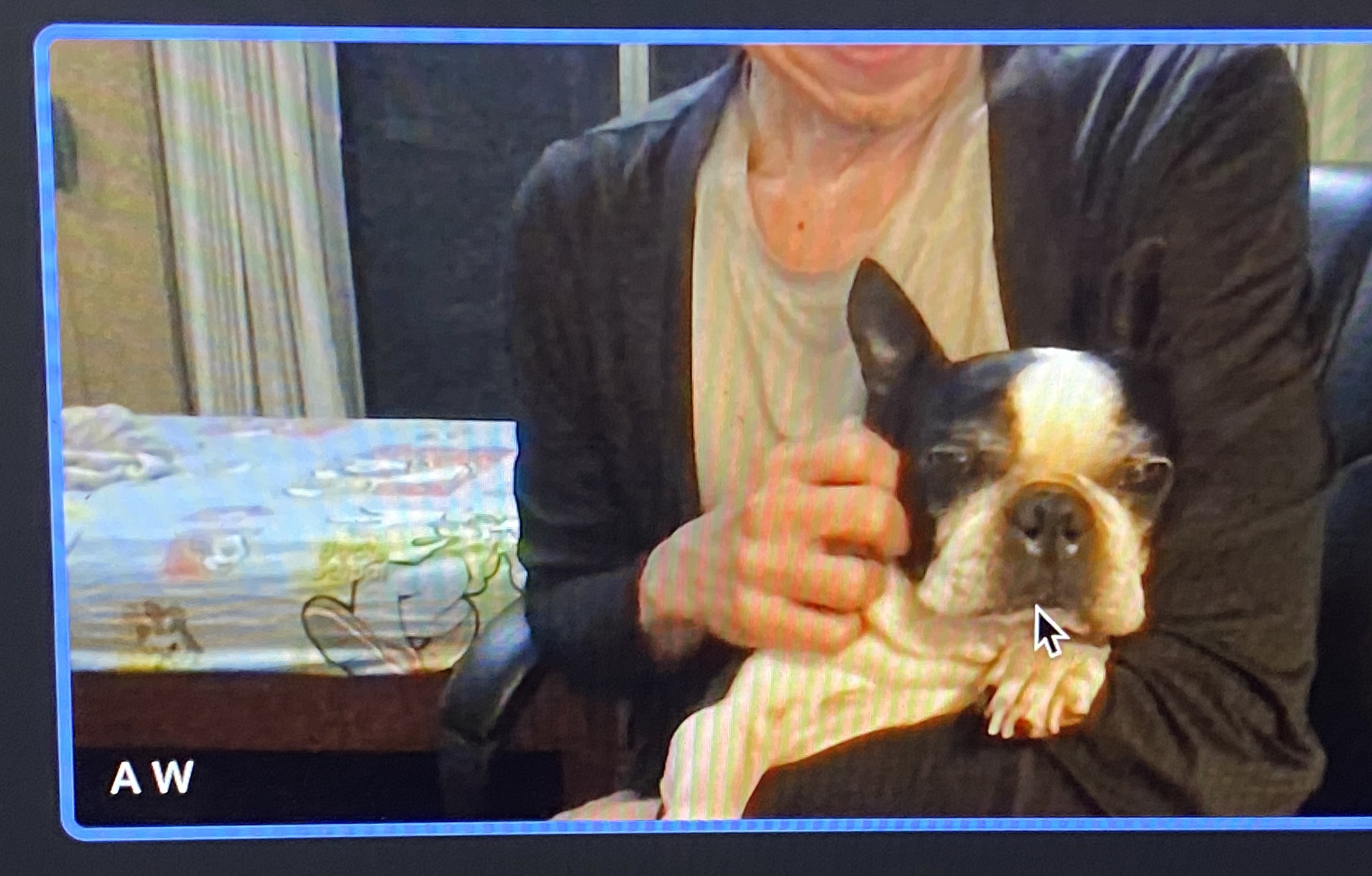
IP: Oh, amazing. What's its name?
AW: [off-mic] Dracula, Dracula! [to Inney] His name is Dracula. I'm visiting my hometown. This is my brother's room. Or my nephew's room.
IP: Hello, Dracula.
AW: Come. He's sleeping. Sleeping time.
IP: Oh, he's a good dog. What kind of dog is he?
AW: He's a Boston Terrier.
“The World of Apichatpong Weerasethakul” runs May 4–14 at Film at Lincoln Center with many titles on 35mm. The director will be in attendance May 4–6 for Q&As.
